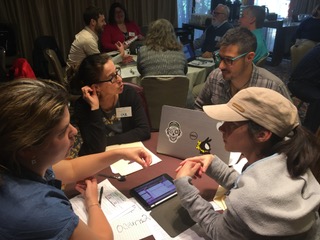The OOI Ocean Data Labs Project
The National Science Foundation’s Ocean Observatories Initiative (OOI) is advancing our ability to understand the natural world by collecting large quantities of data to address complex oceanographic processes. This expanded access to data also provides professors in the geosciences with new opportunities to engage undergraduate students in authentic data experiences using real-world data sets to teach geoscience processes.
However, students struggle to work with data based on their limited experience and exposure to different data types and sources. Also, supporting students in engaging with the data can be challenging for professors too, as there is a lack of adequate tools to easily digest and manipulate large data sets for in-class learning experiences.
Therefore, the OOI Ocean Data Labs Project (formerly called Data Explorations), with funding from NSF, is developing, testing, refining, and disseminating easy to use, interactive Data Explorations and Data Lab Notebooks that will allow undergraduates to use authentic data in accessible ways while being easy for professors to integrate into their teaching.
Recent Blog Posts
The Ocean Observatories Initiative (OOI) Data Labs is pleased to be a (non-funded) sponsored program of the National Association of Geoscience Teachers (NAGT).
NAGT sponsors programs that foster improvements in the teaching and learning about Earth as a system at all levels of formal and informal instruction, emphasize the relevance and cultural significance of geoscience to all people, foster and disseminate knowledge of and research in geoscience education, and promote professional growth of our members. the Data Labs project fully aligns with NAGT’s mission as it works to promote data literacy skills building in undergraduate education using the lens of the geoscience disciplines.


























